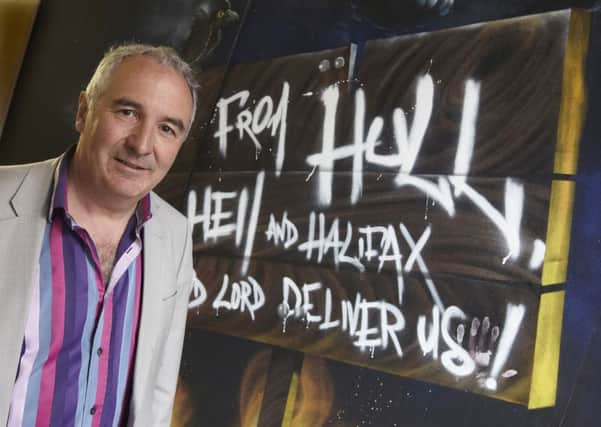Andrew Dixon: From Hull’s hellish image problem, the City of Culture title can deliver prestige


I understand eyebrows were raised when Hull was shortlisted for UK City of Culture, but mainly by people who have never visited the city. While it does have its social and economic challenges, the city needs this title to change those perceptions and tell the real stories of its remarkable contribution to the world.
A team from Hull’s City of Culture 2017 bid will travel to Derry-Londonderry this week to tell the judges why Hull’s name should be in the white envelope when the winning city is announced on November 20.
Advertisement
Hide AdAdvertisement
Hide AdPut simply, if Hull wins, it will be a game changer for a city bombed, flooded and still recovering from the loss of fishing and other traditional industries.
It may be seen as end of the line, but in reality Hull has been at the centre of Maritime Europe for centuries. A place where East meets West, Hull and the Humber offer the UK’s second largest port and a gateway to and from Europe. The city’s philanthropists have donated handsomely to the culture of the nation, from J Arthur Rank and the UK film industry to art collector Joseph Duveen, whose name appears on London galleries at the Tate and British Museum.
The digital age also owes much to Hull. The innovation of liquid crystal for digital displays had its origins at the University of Hull and appears in mobile phones and LED screens around the world.
Richard Wilson’s sculpture Slipstream for Heathrow Airport was made in Hull, while the city is on a journey as its 10-year plan uses culture as the vehicle for transformational regeneration.
Advertisement
Hide AdAdvertisement
Hide AdIt has galleries, award winning museums, theatres, concert halls and quirky bars but for 2017 the city is the venue. Its iconic architecture, bridges, streets, parks, rivers and public spaces make it one of the most distinctive of Yorkshire cities.
Culture changes lives, lifts morale, raises aspirations and defines the very character of cities. It has worked wonders in Gateshead, Glasgow, Liverpool and Derry. In Hull, it has also helped a city to find its voice again. Hull people have a quiet pride in their city and tend not to “shout about it” but they are getting louder as Hull knows what UK City of Culture could mean for its image, jobs and the economy.
Winning the title will deliver a £60m economic boost during 2017. It will also make Hull a more attractive place for inward investment as the city builds new industries in energy and the creative industries.
Hull is now trending on social media and making the national headlines for the right reasons. Its diverse communities may be proud of their roots in Poland, Sierra Leone or the Congo but are also proud to be part of Hull.
Advertisement
Hide AdAdvertisement
Hide AdWhile there will be strong competition from Dundee, Leicester and Swansea Bay, Hull has without doubt made the most of being shortlisted. Of the 80,000 people attending the recent Freedom Festival, 92 per cent knew Hull was bidding for City of Culture.
More than 20 local business “angels” have pledged £17,000 each to back the 2017 bid sending a clear message to the judges about how much this means to the city.
The University of Hull has been a training ground for some of the UK’s best writers, directors and musicians and will celebrate its 90th anniversary in 2017. It is investing over £35m in its library, gallery, Middleton Hall and music technology studios.
Hull City Council has plans for a new dance centre and an upgrade to the hugely popular Ferens Arts Gallery, which saw thousands of visitors for its recent exhibitions of Hockney, Da Vinci and Warhol. Creative enterprises are popping up across Hull’s historic Fruit Market from Fruit Trade Music to the Museum of Club Culture, while local developers Wykeland have recently gained planning permission for a flagship digital innovation centre.
Advertisement
Hide AdAdvertisement
Hide AdIf Hull is successful the benefits will ripple across Yorkshire. Building on themes such as freedom and Hull’s quirkiness, there will be culture 365 days a year with over 1,500 events. A spectacular opening ceremony will bring 3,000 volunteers together to create four “rivers” of light, sound and stories flowing into the city.
Elephants will walk the streets of Hull again alongside lost trawlermen, dancing white phone boxes and images of Hull’s rich history. The year will see other Yorkshire partners such as Opera North, Beverley Folk Festival and Yorkshire Sculpture Park working in the city, along with returning alumni like Roland Gift and Mark Herman.
This week sees the release of a film, This City Belongs to Everyone. Narrated by Sir Tom Courtenay and echoing the words of poet Philip Larkin, it captures the diversity and spirit of a place that has “a different resonance”.
It’s our time again. Hull is place where people are slow to leave and quick to return.
Advertisement
Hide AdAdvertisement
Hide AdOur message to the City of Culture judges is that Hull wants it, Hull needs it and Hull is ready to deliver. Perhaps people will raise eyebrows for a different reason when they visit in 2017.
Twitter @2017Hull #HullYes
*Andrew Dixon is the bid advisor and programme director of Hull’s City of Culture bid.